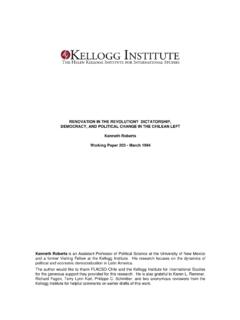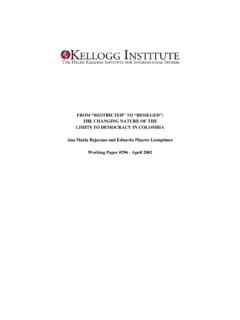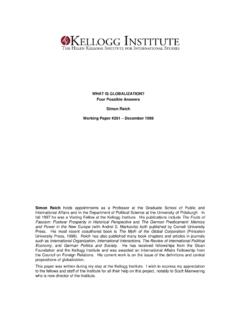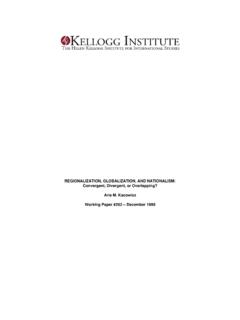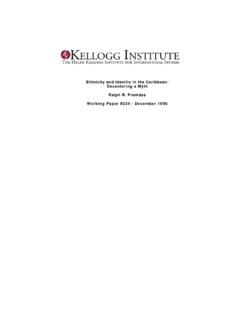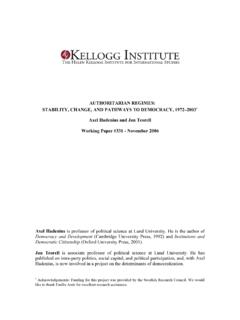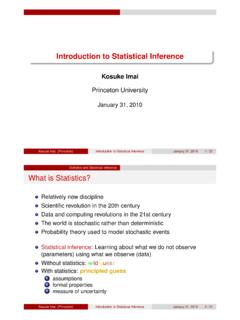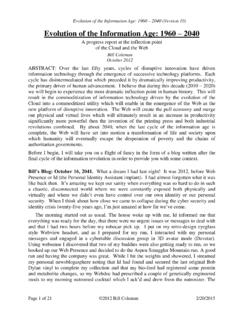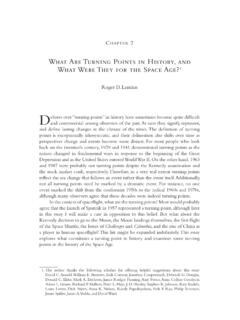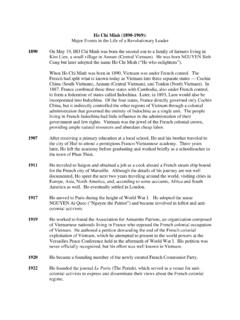Transcription of THE PAST AND PRESENT OF COMPARATIVE POLITICS …
1 THE PAST AND PRESENT OF COMPARATIVE POLITICS Gerardo L. Munck* Working Paper #330 October 2006 Gerardo L. Munck ( University of California, San Diego, 1990) teaches in the School of International Relations at the University of Southern California (USC). His books include Regimes and Democracy in Latin America (Oxford, forthcoming, 2007); Passion, Craft, and Method in COMPARATIVE POLITICS (with Richard Snyder; Johns Hopkins, forthcoming, 2007); and Authoritarianism and Democratization. Soldiers and Workers in Argentina, 1976-83 (Penn State, 1998). Some of his recent articles are: (with Snyder) Debating the Direction of COMPARATIVE POLITICS : An Analysis of Leading Journals, COMPARATIVE Political Studies (2007); (with Jay Verkuilen) Research Designs, in Kempf-Leonard (ed.)
2 , Encyclopedia of Social Measurement Vol. 3 (2005); and Democratic POLITICS in Latin America, Annual Review of Political Science Vol. 7 (2004). He worked on Democracy in Latin America (2004), a report of the United Nations Development Programme (UNDP), and is active in various initiatives to promote and monitor democracy. *This paper will be published in Gerardo L. Munck and Richard Snyder, Passion, Craft, and Method in COMPARATIVE POLITICS (Baltimore, MD: Johns Hopkins University Press, forthcoming, 2007). I would like to acknowledge the helpful comments I received from Robert Adcock, Andrew Gould, Richard Snyder and one anonymous reviewer. ABSTRACT This paper focuses on the past and PRESENT of COMPARATIVE POLITICS in the US. The discussion is organized around three issues: the definition of the field s subject matter, the role of theory, and the use of methods.
3 These three issues are the basis for an identification of distinct periods in the history of COMPARATIVE POLITICS and for assessments of the state of the field. Attention is also given to the link between COMPARATIVE POLITICS , on the one hand, and other fields of political science and other social sciences, on the other hand, and, more briefly, to political events and the values held by scholars of COMPARATIVE POLITICS . The evolution of COMPARATIVE POLITICS is seen as punctuated by two revolutions: the behavioral revolution , during the immediate post-World War II years until the mid-1960s, and the second scientific revolution , which started around the end of the Cold War and is still ongoing. On both occasions, the impetus for change came from developments in the field of American POLITICS and was justified in the name of science.
4 However, the ideas advanced by these two revolutions differed. The behavioral revolution drew heavily on sociology; in contrast, the second scientific revolution imported many ideas from economics and also put a heavier emphasis on methodology. Though scholars of COMPARATIVE POLITICS have produced a vast amount of knowledge about POLITICS , divisions within the field continue to hamper progress. Emphasis is placed on the need to recognize the depth of the roots of COMPARATIVE POLITICS in a humanistic tradition and the vital importance of its scientific aspirations. RESUMEN Este art culo se concentra en el pasado y el presente de la pol tica comparada en los Estados Unidos. La discusi n se organiza alrededor de tres asuntos: la definici n del objeto de estudio de este campo, el rol de la teor a, y el uso de m todos.
5 Basado en estos tres asuntos, se identifican per odos distintivos en la historia de la pol tica comparada y se eval a el estado del campo. Tambi n se presta atenci n al v nculo entre la pol tica comparada y otros campos de la ciencia pol tica y otras ciencias sociales, y, m s brevemente, los eventos pol ticos y los valores que sostienen los comparativistas. Se observa a la evoluci n de la pol tica comparada ha sido marcada por dos revoluciones: la revoluci n conductista, entre la inmediata post-guerra y mediados de los 60s y la segunda revoluci n cient fica, que comenz alrededor del fin de la Guerra Fr a y contin a en curso. En ambas ocasiones, los impulsos hacia el cambio provinieron de desarrollos en el campo de estudios de pol tica norteamericana y fueron justificados en nombre de la ciencia.
6 Sin embargo, estas dos revoluciones avanzaron ideas diferentes. La revoluci n conductista se apoy fuertemente en la sociolog a; en contraste, la segunda revoluci n cient fica import muchas ideas de la econom a y puso un acento m s fuerte en la metodolog a. Aunque los comparativistas han producido un vasto c mulo de conocimientos acerca de la pol tica, las divisiones dentro del campo de estudios contin an impidiendo su progreso. Se enfatiza la necesidad de reconocer la profundidad de las ra ces de la pol tica comparada en una tradici n human stica y la importancia vital de sus aspiraciones cient ficas. COMPARATIVE POLITICS emerged as a distinct field of political science in the United States in the late 19th century and the subsequent evolution of the field was driven largely by research associated with US universities.
7 The influence of US academia certainly declined from its high point in the two decades following World War II. Indeed, by the late 20th century, COMPARATIVE POLITICS was a truly international enterprise. Yet the sway of scholarship produced in the US, by US- and foreign-born scholars, and by US-trained scholars around the world, remained undisputable. The standard for research in COMPARATIVE POLITICS was set basically in the US. In sum, a large part of the story of COMPARATIVE POLITICS has been, and continues to be, written by those who work and have been trained within the walls of US This paper focuses on the past and PRESENT of COMPARATIVE POLITICS in the US. The discussion is organized around three issues: the definition of the field s subject matter, the role of theory, and the use of methods.
8 These three issues are the basis for an identification of distinct periods in the history of COMPARATIVE POLITICS and for assessments of the state of the field. Attention is also given to the link between COMPARATIVE POLITICS , on the one hand, and other fields of political science and other social sciences, on the other hand, and, more briefly, to political events and the values held by scholars of COMPARATIVE POLITICS . The argument presented here is as follows. Since the institutionalization of political science as an autonomous discipline, a process initiated in the late 19th century, the evolution of COMPARATIVE POLITICS was punctuated by two revolutions: the behavioral revolution , that had its greatest impact on COMPARATIVE POLITICS during the immediate post World War II years until the mid-1960s, and the second scientific revolution , that started around the end of the Cold War and is still ongoing.
9 On both occasions, the impetus for change came from developments in the field of American POLITICS and was justified in the name of science. However, the ideas advanced by, and the impact of, these two revolutions differed. The behavioral revolution drew heavily on sociology; in contrast, the second scientific revolution imported many ideas from economics and also put a heavier emphasis on methodology. Moreover, though each revolution centrally involved a tension between traditionalists and innovators, the current revolution is taking 2 Munck place in a more densely institutionalized field and is producing, through a process of adaptation, a relatively pluralistic landscape. Beyond this characterization of the origin and evolution of COMPARATIVE POLITICS , this paper draws some conclusions about the current state of the field and offers, by way of parting words, a suggestion regarding its future.
10 Concerning the PRESENT , it stresses that scholars of COMPARATIVE POLITICS comparativists, for short have accomplished a lot and produced a vast amount of knowledge about POLITICS , but also have fallen short of fulfilling the field s mission to develop a global science of POLITICS due to some serious shortcomings. Specifically, the lack of a general or unified theory of POLITICS , and the failure to produce robust, broad empirical generalizations about world POLITICS , are highlighted. Concerning the future of COMPARATIVE POLITICS , this paper suggests that potentially paralyzing or distracting divisions among comparativists, which hamper progress in the field, will only be overcome inasmuch as comparativists appreciate both the depth of the roots of COMPARATIVE POLITICS in a humanistic tradition and the vital importance of its scientific aspirations.
